
A bacteriophage, also known informally as a phage, is a virus that infects and replicates within bacteria and archaea. The term was derived from "bacteria" and the Greek φαγεῖν, meaning "to devour". Bacteriophages are composed of proteins that encapsulate a DNA or RNA genome, and may have structures that are either simple or elaborate. Their genomes may encode as few as four genes and as many as hundreds of genes. Phages replicate within the bacterium following the injection of their genome into its cytoplasm.

Kary Banks Mullis was an American biochemist. In recognition of his role in the invention of the polymerase chain reaction (PCR) technique, he shared the 1993 Nobel Prize in Chemistry with Michael Smith and was awarded the Japan Prize in the same year. PCR became a central technique in biochemistry and molecular biology, described by The New York Times as "highly original and significant, virtually dividing biology into the two epochs of before PCR and after PCR."
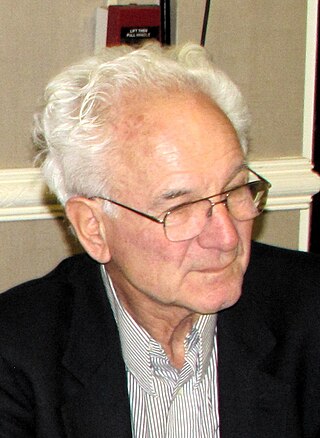
Peter Heinz Hermann Duesberg is a German-American molecular biologist and a professor of molecular and cell biology at the University of California, Berkeley. He is known for his early research into the genetic aspects of cancer. He is a proponent of AIDS denialism, the claim that HIV does not cause AIDS.

HIV/AIDS denialism is the belief, despite conclusive evidence to the contrary, that the human immunodeficiency virus (HIV) does not cause acquired immune deficiency syndrome (AIDS). Some of its proponents reject the existence of HIV, while others accept that HIV exists but argue that it is a harmless passenger virus and not the cause of AIDS. Insofar as they acknowledge AIDS as a real disease, they attribute it to some combination of sexual behavior, recreational drugs, malnutrition, poor sanitation, haemophilia, or the effects of the medications used to treat HIV infection (antiretrovirals).

A prophage is a bacteriophage genome that is integrated into the circular bacterial chromosome or exists as an extrachromosomal plasmid within the bacterial cell. Integration of prophages into the bacterial host is the characteristic step of the lysogenic cycle of temperate phages. Prophages remain latent in the genome through multiple cell divisions until activation by an external factor, such as UV light, leading to production of new phage particles that will lyse the cell and spread. As ubiquitous mobile genetic elements, prophages play important roles in bacterial genetics and evolution, such as in the acquisition of virulence factors.

Phage therapy, viral phage therapy, or phagotherapy is the therapeutic use of bacteriophages for the treatment of pathogenic bacterial infections. This therapeutic approach emerged at the beginning of the 20th century but was progressively replaced by the use of antibiotics in most parts of the world after the Second World War. Bacteriophages, known as phages, are a form of virus that attach to bacterial cells and inject their genome into the cell. The bacteria's production of the viral genome interferes with its ability to function, halting the bacterial infection. The bacterial cell causing the infection is unable to reproduce and instead produces additional phages. Phages are very selective in the strains of bacteria they are effective against.
Alive & Well AIDS Alternatives is a 501(c) non-profit organization of AIDS denialists. The organization's stated mission is to "present information that raises questions about the accuracy of HIV tests, the safety and effectiveness of AIDS drug treatments, and the validity of most common assumptions about HIV and AIDS." The organization's founder, Christine Maggiore estimated in 2005 that the organization had assisted about 50 HIV-positive mothers in developing legal strategies to avoid having their children tested or treated for HIV.

Lysogeny, or the lysogenic cycle, is one of two cycles of viral reproduction. Lysogeny is characterized by integration of the bacteriophage nucleic acid into the host bacterium's genome or formation of a circular replicon in the bacterial cytoplasm. In this condition the bacterium continues to live and reproduce normally, while the bacteriophage lies in a dormant state in the host cell. The genetic material of the bacteriophage, called a prophage, can be transmitted to daughter cells at each subsequent cell division, and later events can release it, causing proliferation of new phages via the lytic cycle.
Bacteriophage (phage) are viruses of bacteria and arguably are the most numerous "organisms" on Earth. The history of phage study is captured, in part, in the books published on the topic. This is a list of over 100 monographs on or related to phages.

Lysins, also known as endolysins or murein hydrolases, are hydrolytic enzymes produced by bacteriophages in order to cleave the host's cell wall during the final stage of the lytic cycle. Lysins are highly evolved enzymes that are able to target one of the five bonds in peptidoglycan (murein), the main component of bacterial cell walls, which allows the release of progeny virions from the lysed cell. Cell-wall-containing Archaea are also lysed by specialized pseudomurein-cleaving lysins, while most archaeal viruses employ alternative mechanisms. Similarly, not all bacteriophages synthesize lysins: some small single-stranded DNA and RNA phages produce membrane proteins that activate the host's autolytic mechanisms such as autolysins.
The Perth Group is a group of HIV/AIDS denialists based in Perth, Western Australia who claim, in opposition to the scientific consensus, that the existence of HIV is not proven, and that AIDS and all the "HIV" phenomena are caused by changes in cellular redox due to the oxidative nature of substances and exposures common to all the AIDS risk groups, and are caused by the cell conditions used in the "culture" and "isolation" of "HIV".
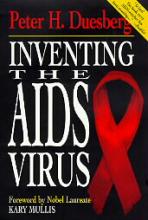
Inventing the AIDS Virus is a 1996 book by molecular biologist Peter Duesberg, in which the author argues that HIV does not cause AIDS. Duesberg contends that HIV is a harmless passenger virus and that AIDS is caused by unrelated factors such as drug abuse, antiretroviral medication, chronic malnutrition, poor sanitation, and hemophilia. The unambiguous scientific consensus is that HIV causes AIDS and that Duesberg's claims are incorrect. Duesberg received a negative response from the scientific community for supporting AIDS denialism, misrepresenting and ignoring the scientific evidence that HIV causes AIDS, and for relying upon poor logic and manipulation. The book was also the subject of an authorship dispute with one of his graduate students.
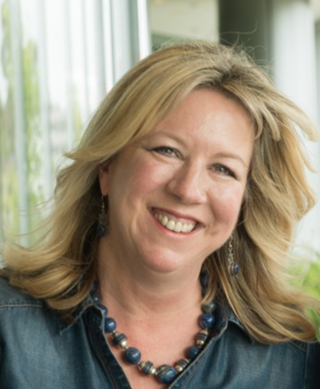
Steffanie A. Strathdee is a Harold Simon Distinguished Professor at the University of California San Diego School of Medicine and Co-Director at the Center for Innovative Phage Applications and Therapeutics. She is known for her work on HIV research and prevention programmes in Tijuana.
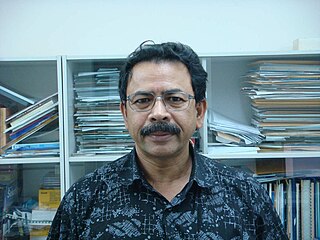
Shah Mohammad Faruque is a professor and the dean of the School of Environment and Life Sciences at Independent University Bangladesh (IUB). He is widely recognized for his research in Vibrio cholerae, the bacterium which causes the epidemic diarrhoeal disease Cholera. Among other positions, previously he was a professor at BRAC University; director of the Genomics Centre at the International Centre for Diarrhoeal Disease Research, Bangladesh (ICDDR,B), and formerly director of the Centre for Food and Water Borne Diseases in ICDDR,B. His areas of research interest include microbial genomics, bacteriophages, environmental microbiology, ecology, and evolution of bacterial pathogens, particularly those associated with waterborne and foodborne diseases. Faruque is primarily known for his work in genomics, epidemiology and ecology of the cholera pathogen, and its bacteriophages.
In biology, a pathogen, in the oldest and broadest sense, is any organism or agent that can produce disease. A pathogen may also be referred to as an infectious agent, or simply a germ.
In South Africa, HIV/AIDS denialism had a significant impact on public health policy from 1999 to 2008, during the presidency of Thabo Mbeki. Mbeki criticized the scientific consensus that HIV is the cause of AIDS beginning shortly after his election to the presidency. In 2000, he organized a Presidential Advisory Panel regarding HIV/AIDS including several scientists who denied that HIV caused AIDS.
Bacteriophage Mu, also known as mu phage or mu bacteriophage, is a muvirus of the family Myoviridae which has been shown to cause genetic transposition. It is of particular importance as its discovery in Escherichia coli by Larry Taylor was among the first observations of insertion elements in a genome. This discovery opened up the world to an investigation of transposable elements and their effects on a wide variety of organisms. While Mu was specifically involved in several distinct areas of research, the wider implications of transposition and insertion transformed the entire field of genetics.
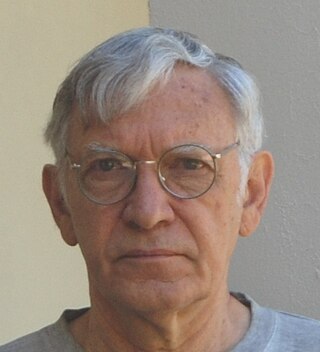
Helios Murialdo is a Chilean-Canadian molecular biologist, fiction writer, and ecologist. His research in the field of the assembly and structure of bacterial viruses contributed to the development of the first system for the cloning of human genes. He has published six novels and is a member of a group of conservationists that established a Natural Reserve in the central part of the Chilean Biodiversity Hotspot. Son of an Italian immigrant father and a Chilean mother of French descent, he has a brother and a sister. He is a member of the board of directors of the non-profit Fundación Ciencia & Vida, a scientific and technological institution with headquarters in Santiago, Chile. He is president of the NGO Corporación Altos de Cantillana, which manages the 26,000 acres of the Altos de Cantillana Natural Reserve in the coastal mountains of central Chile. He makes his home in this Natural Reserve, and spends the rest of the year in Toronto, Canada.

Robert "Chip" T. Schooley is an American infectious disease physician, who is the Vice Chair of Academic Affairs, Senior Director of International Initiatives, and Co-Director at the Center for Innovative Phage Applications and Therapeutics (IPATH), at the University of California San Diego School of Medicine. He is an expert in HIV and hepatitis C (HCV) infection and treatment, and in 2016, was the first physician to treat a patient in the United States with intravenous bacteriophage therapy for a systemic bacterial infection.
Martha Rebecca Jane Clokie is a Professor of Microbiology at the University of Leicester. Her research investigates the identification and development of bacteriophages that kill pathogens in an effort to develop new antimicrobials.













